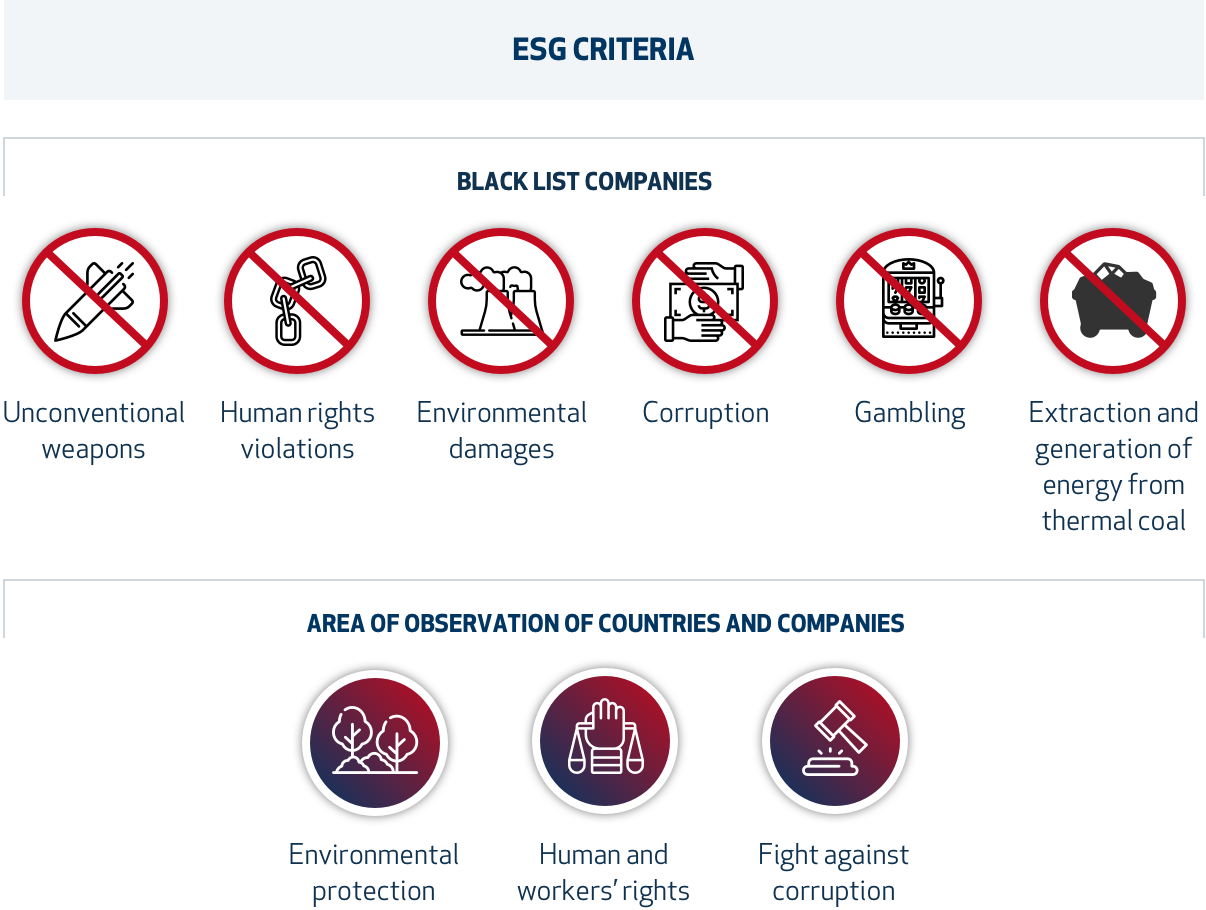Investments
The Group’s investment policies pursue a long-term outlook following the general criteria of prudence and preservation of asset quality through a securities selection process based on diversification and financial strength, as well as our commitment to combine economic and profitability objectives with environmental, social and governance aspects (ESG approach) by evaluating each individual investment.
The “Guidelines for responsible investing” indicate how the Group identifies and manages risks and impacts that are significant with respect to the ESG factors, and how it financially supports sustainable development, promoting:
- the incorporation of the ESG factors into the analysis of investments and related decision-making process, the selection criteria of the issuers and management of the investments themselves;
- progressive expansion of the oversight of financial assets in terms of ESG performance and extension of the offer of financially sustainable products;
- thematic investments and investments that make an impact through which the Group can play an active role in helping to reduce environmental or social problems such as the challenges of climate change, the depletion of resources and economic and social inequality.
In 2023, the percentage of assets subject to ESG monitoring out of total assets under management is 76.3%.
INVESTMENT STRATEGIES
The ESG Factors are incorporated into decision-making processes relating to financial investments by adopting the following investment strategies:
- Screening of the ESG performance that considers, inter alia, international conventions on sustainability;
- Product-based and conduct-based exclusions.
- The due evaluation of the environmental, social and governance dimension, carried out by taking account of the characteristics of the industry in which the Issuers operate and organised into the various specifications that make them up, define their ranking from an ESG standpoint. By incorporating the results of these analyses into the investment decision-making process, the Group monitors the sustainability risks and the responsible behaviour of both corporate and government issuers.
At 31 December 2023 the excluded issuers related to human rights violations are 57.

THEMATIC AND IMPACT INVESTMENTS
Alternative investments (thematic and impact) related to areas or activities linked to the development of sustainability and focus on one or more ESG issues.
A portion of the Group portfolio is devoted to the development of thematic investments to help achieve the 2030 Agenda. The Unipol Group believes thematic investments are an opportunity that permits financial resources to be directed towards social or environmental targets with the advantage of being able to measure the result achieved.
A methodological due diligence process was developed to select and report on these alternative investments which calls for the usual financial analyses and the analyses of the social and environmental and governance (ESG) criteria, constantly reviewed and updated, and the map of non-financial risks that could have a reputational impact.
The thematic investments and impact investments were subject to a specific target in the Unipol Group 2022-2024 Strategic Plan; more specifically, Unipol undertakes to increase those investments by 50% in the three-year period, increasing from €862m in 2021 to €1,300m in 2024.
ROLES AND RESPONSIBILITIES IN APPLICATION OF INVESTMENT POLICY SRI
The Board of Directors approves the results of the SRI screening in the Group's Integrated Report; approves the objectives of the SRI strategy every three years and monitors them every year.
The Chief Investment Officer and the Investment Committee discuss and approve the investment process and related activities.
The Head of the Alternative Investments office, with the support of the staff dedicated to SRI investments, seeks sustainable investment opportunities (positive impact on the SDGs) within the asset class represented by Alternative Funds (Private Equity, Hedge Funds, Real Asset) . Portfolio managers invest in compliance with the SRI policy; in particular, those who manage an ESG portfolio invest in compliance with the Fund's SRI policy.
The sustainability function oversees the reporting process for integrated and sustainability reporting.


